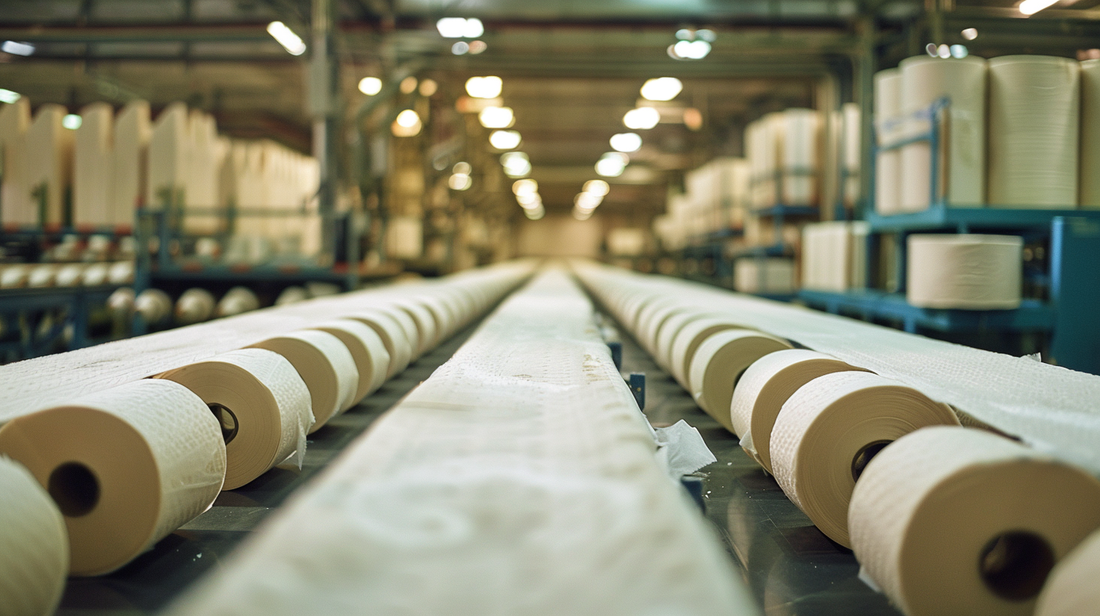Discover why Doogood chooses to produce its bamboo toilet paper in China. Learn about the abundant bamboo resources, expertise in processing, and commitment to sustainability that make China the perfect location for manufacturing eco-friendly products. Join us as we strive for a greener future, one roll at a time.
Which is best toilet paper in the world? At DooGood, we're committed to making environmentally friendly choices in every aspect of our business. One such decision is sourcing and manufacturing our bamboo toilet paper in a tropical country, China. In this article, we'll explain why we made this choice and how it aligns with our commitment to sustainability.
Our bamboo toilet paper is made in China at an FSC-certified facility, ensuring strict quality and environmental standards. We collaborate closely with our partners to uphold ethical practices from bamboo sourcing to product packaging.
We've decided to source our bamboo toilet paper from China for its abundant bamboo resources, expertise in processing, and a strong commitment to sustainability. Its strategic location also ensures efficient global distribution of our bamboo toilet paper.
While bamboo can indeed grow in the UK, its cultivation may not be as practical or economically feasible due to climate limitations. Therefore, importing from China allows us to offer high-quality, sustainable products to our customers worldwide at competitive prices.
Abundant Bamboo Resources
China's tropical climate and fertile soil provide ideal conditions for bamboo cultivation. Bamboo, a fast-growing grass, thrives in diverse climates and matures within a few years, making it a highly renewable resource. With vast bamboo forests across the country, China offers an abundant and sustainable source of raw materials for our toilet paper production.
Expertise in Bamboo Processing
China has a long history of bamboo cultivation and craftsmanship, dating back centuries. Manufacturers in China have honed their skills and perfected bamboo processing techniques, ensuring high-quality and efficient production processes. By partnering with experienced manufacturers in China, we can leverage their expertise to deliver premium-quality bamboo toilet paper to our customers.
Commitment to Sustainability
China has made significant strides in promoting sustainability and environmental conservation in recent years. Our manufacturing partners in China are committed to adhering to strict environmental standards and implementing sustainable practices throughout the production process. From resource conservation to waste management and emissions control, our manufacturing facilities in China prioritise sustainability, aligning with our commitment to environmental stewardship.
Global Accessibility and Distribution
China's strategic location and well-developed transportation infrastructure make it a hub for global trade and commerce. Manufacturing our bamboo toilet paper in China enables efficient distribution of our products worldwide, ensuring accessibility and affordability for consumers in various regions. This global reach allows us to promote sustainable living and offer eco-friendly alternatives to traditional toilet paper on a larger scale.
The decision to source and manufacture our bamboo toilet paper in China is rooted in sustainability, expertise, and accessibility. By leveraging China's abundant bamboo resources, expertise in bamboo processing, and commitment to sustainability, we can deliver high-quality and eco-friendly products to our customers worldwide.
As we continue on our journey towards a greener future, we remain committed to making environmentally conscious decisions that benefit both people and the planet.
References
- China Daily. (2020). Bamboo plantations now cover 6.08 million hectares in China. China Daily.
- Fang, Y., & Gong, Y. (2018). Bamboo as a raw material: Fundamentals, processing, properties, and applications. Elsevier. [DOI: 10.1016/B978-0-12-813483-5.00010-1]
- Ministry of Ecology and Environment of the People's Republic of China. (2020). China releases guidelines for developing ecological civilization.
- Shen, L., Guan, D., & Cheng, H. (2010). Urbanisation in China: Trends, policies, and impacts. Sage Journals. [DOI: 10.1177/097185241401700305]
- Xinhua. (2021). China's tropical region to boost digital economy, eco-friendly development. Xinhua.
